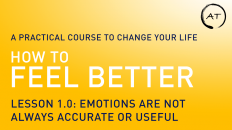Humans are extremely adaptive. If we encounter a new circumstance, we find a way to cope with it. When the circumstance doesn’t change, the mind says, “Hey, this seems like it won’t change. I’m going to stop using energy thinking about it.”
It’s like how lottery winners return to the same level of happiness after some time passes.
The mind has no reason to notice things that have become “normal” for you. If you survive your “normal” day, then anything normal is safe. The mind has unsafe things to look out for instead.
When you first experience a new emotion, you think about it a lot. If the emotion is not resolved in a month or so, you begin paying less attention to it. Think about someone who had a bad breakup. At first they are heartbroken. Then they are sad. Eventually, they are just jaded. But their heartbreak is still there. The heartbreak is present whenever they enter a new relationship.
Over the decades, our emotions pile up. We have tons of emotions that we aren’t noticing. When you feel “normal,” that’s not how other people feel when they feel “normal.” Everyone has a unique set of emotions interacting with every moment of their life.
If you’ve come to this site, I assume that your emotions have gotten to the point where you want them to feel better. You will absolutely learn to feel better. But how did it get to the point where you suddenly noticed you weren’t feeling as good as you should?
Every negative emotion you have gotten used to is building up. Just because you don’t notice the feelings, does not mean they aren’t taking their toll. When a threshold is crossed, you will notice your burden. It’s like boiling a frog. If you place a frog in cool water and then gradually increase the temperature, the frog doesn’t notice that the water is too hot. The frog adjusts to the slightly warmer water, then adjusts again when it gets slightly warmer. Then all of a sudden (to the frog), the water begin’s boiling and the frog is not so happy.
We’re not only going to get you out of the boiling water, but will also show you how to tell when the temperature is rising and how to cool it back down.
Stress is one more example of lingering emotions to cement your understanding.


